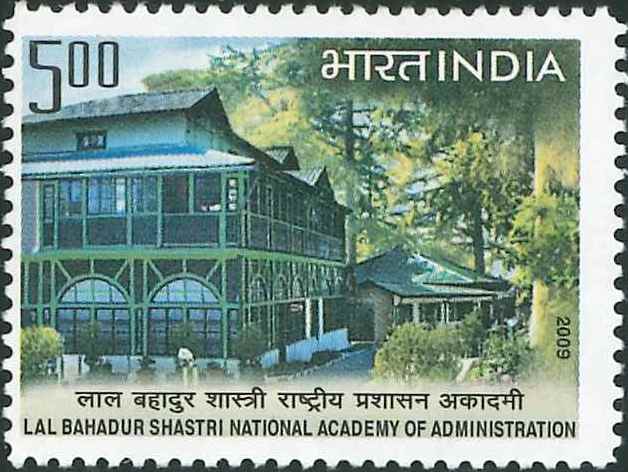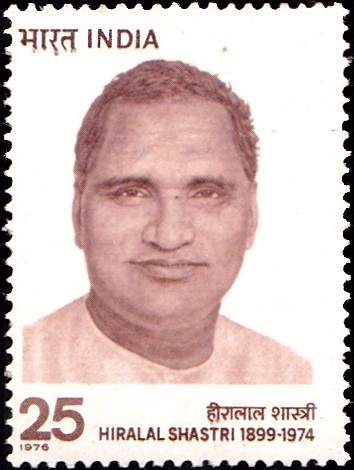
LBSNAA, Mussoorie
A commemorative postage stamp on the 50 years of the Lal Bahadur Shastri National Academy of Administration (LBSNAA), an Indian research and training institute on public policy and public administration :
 Issued by India
Issued by India
Issued on Jul 4, 2009
Issued for : India Post is happy to commemorate the Golden Jubilee of Lal Bahadur Shastri National Academy of Administration with the release of a postage stamp.
Credits :
Stamp & FDC : Kamleshwar Singh
Cancellation : Alka Sharma
Type : Stamp, Mint Condition
Colour : Multi colour
Denomination : 500 Paise
Stamps Printed : 0.4 Million
Printing Process : Photogravure
Printer : India Security Press, Nasik
About :
- The Lal Bahadur Shastri National Academy of Administration, Mussoorie is the apex training institution for senior members of the Civil Services of India. Established in 1959, after the erstwhile civil services training set up moved from Metcalfe House in Delhi, the Academy was housed in the grand Charleville Hotel at Mussoorie. Set amidst oak and cedar vegetation at an altitude of 2000 metres above sea level, the Academy has grown into a true embodiment of excellence in the Civil Services. In 1975, the National Academy of Administration was named after the country’s second Prime Minister Lal Bahadur Shastri, an epitome of humility and honesty.
- The Academy is a virtual melting pot where people across generations, from every part of our country and beyond, come in contact with each other. It is a place where participants from every state, speaking different languages, with diverse qualifications and socio-educational backgrounds meet, interact and learn from each other. The participants range from the brilliant young women and men beginning their career in public service, after qualifying in a gruelling competitive examination, to senior officials. This varied mix of people results in a continuous process of innovations and improvements in administration.
- The Academy conducts a range of courses for both fresh entrants to the premier Civil Services as well as mid-career training programmes for civil servants. The Academy endeavours to inculcate in the trainees a strong sense of camaraderie and espirit de corps. During the Course, the trainees go for a 10 day trek as well as a 10-day village visit to have a first-hand assessment of the empirical realities of rural life. The faculty comprises a healthy blend of senior administrators and academicians and researchers. The administrators combine the richness of their field experience with strong academic achievements to provide a stimulating atmosphere for learning. Apart from this, the Academy has constituted autonomous centres working under its aegis to undertake meaningful research on various aspects of governance. The National Institute of Administrative Research (NIAR), Centre for Rural Studies (CRS), National Literacy Resource Centre (NLRC), Centre for Disaster Management (CDM) and Centre for Cooperatives and Rural Development (CCRD). These centres have been undertaking independent research and bringing out publications on subjects of topical interest.
- Notwithstanding the limitations imposed by its location, the Academy prides itself on infrastructure that is at par with the best in the country and in South Asia. The Academy has over 150 hostel rooms and is undertaking construction of another 150 executive hostel rooms. The Academy has one of the country’s finest libraries, the Gandhi Smriti Library, with a collection of around 1.75 lakh volumes and subscription of 400 journals and periodicals. The teaching class rooms and lecture theatres are equipped with the latest teaching aids and projection systems. The Academy lays equal emphasis on physical well-being an emphasis borne outlay its modern and well equipped Sports Complex.
- The Academy completes five decades of its existence this year and is celebrating its Golden Jubilee. The raison de etre of its existence remains as relevant today as it was at the time of its establishment. As enunciated in its vision statement the Academy “strives to promote good governance, by providing quality training for building a professional and responsive civil service in a caring, ethical and transparent framework”.
- With the country firmly on the path towards fast economic development, the role of professional, humane and people-centric civil services cannot be overemphasized. The Academy is conscious of the vision articulated by the founding father of All-India Services Sardar Vallabhbhai Patel in 1949 before the country’s Constituent Assembly when he stated, “you will not have a united India if you do not have a good all–India Service which has the independence to speak out its mind, which has a sense of security.”
- Text : As per the material provided by the proponent.
Subscribe
Login
0 Comments
Oldest







